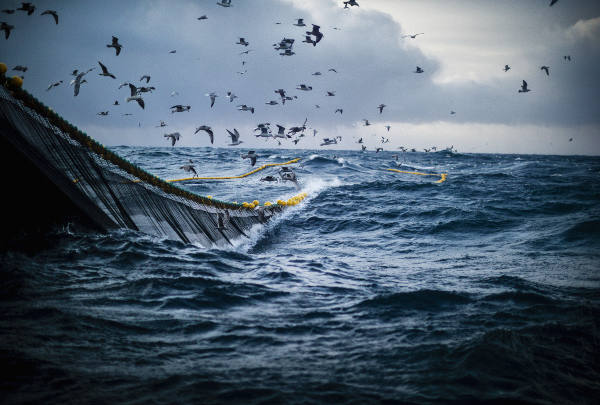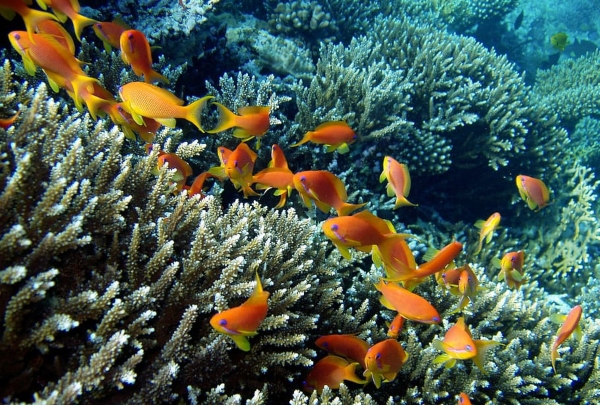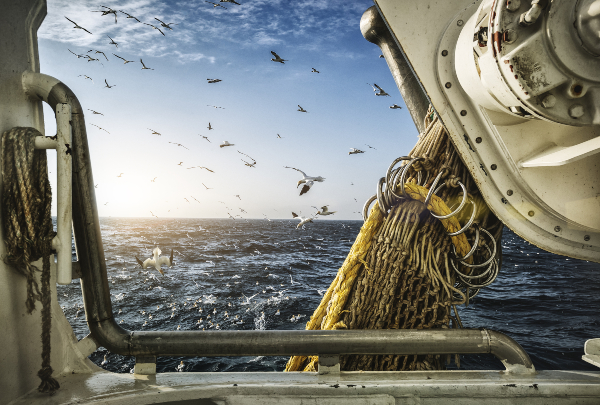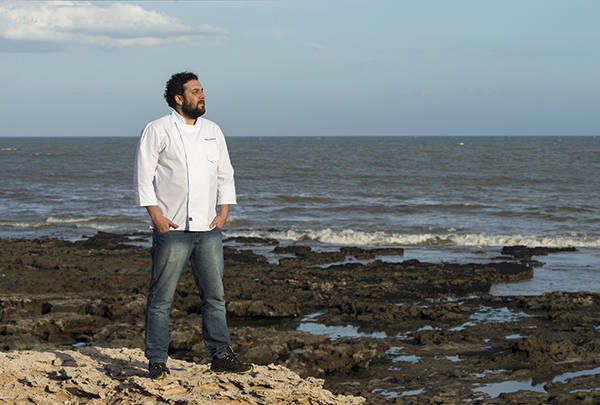Interview
Enric Sala & Manu San Félix: “The enemy of fishing is overfishing, not marine reserves”

Marine biologists Enric Sala and Manu San Félix come to Meeting of the Seas to receive the Sartun Award for their Pristine Seas project aimed at ocean preservation. We talked to them about their work for the environment and how they see the future for the planet’s greatest source of life.
Enric Sala and Manu San Félix spearhead one of the National Geographic Society’s most noteworthy projects. For the last ten years, they have been identifying, protecting and restoring the last remaining wild parts of the ocean through the Pristine Seas project whose endeavours Meeting of the Seas has chosen to acknowledge through a Sartun Award. One Catalan and one Madrilenian, both marine biologists who dedicate their lives to the sea and saving it and who are sounding the alarm for action to be taken now: “If we protect the Mediterranean Sea, which right now has nothing pristine in it, there’s still time to go back to how our grandparents knew it”.
Their advice – “We must protect at least 30% of the sea by 2030” – and suggestions – “Cooks should show how we can eat from the sea without endangering vulnerable species” --, tells us a little about these two prominent Spaniards. Incidentally, Sala was the first Spanish national to become National Geographic Explorer-in-Residence – the highest research and exploration category in the prestigious US society which has just 15 members from across the world. Let’s listen to them talk to us about their project.
How do a Catalan and a Madrilenian end up working for National Geographic?
Enric Sala: I approached National Geographic about Pristine Seas in 2008 as a project that would combine exploration, research and communication to protect the planet’s wildest spots. They liked the idea and I moved to Washington DC – where I now live – in July 2008 to develop and run the project. Right away I invited Manu to join our first expedition as underwater cameraman. We’ve been working together since.
Manu San Félix: I’m at National Geographic because of Enric who called me to join this amazing project. I never dreamed I could work for National Geographic, a society I’ve been a fan of since I was very young. My involvement in Pristine Seas is on the expeditions. When I’m not on one, I live in the Balearic Islands where I spend my time between Formentera and Ibiza.
You say you are proud of working for National Geographic. What’s the organisation’s ultimate objective?
ES: Its mission is to explore, highlight and help preserve our world’s wonders through research, education and communication. A dream.
Pristine Seas seeks to identify, protect and restore the ocean’s last remaining truly wild places. To date, the project has helped create 22 marine reserves covering 5.8m square kilometres. Are you satisfied?
MSF: I remember the first Pristine Seas expedition in 2009. At the time, we couldn’t imagine Eric’s dream would achieve so much in terms of number of marine reserves and ocean area protected. Our ocean conservation results are spectacular and the good thing about it is that we can measure and actually count the number of kilometres protected. Personally, I believe that Pristine Seas has been key and ground-breaking in setting the oceans’ protection machinery in motion, which many countries have joined since. A lot remains to be done, but right now there’s a marine protection “atmosphere” or “mode” that didn’t exist ten years ago and Pristine Seas has a lot to do with it.
ES: It’s true. We couldn’t be happier with the results.
You’re being presented with the Meeting of the Seas’ award which acknowledges the work of an individual, group or organisation in defence of the seas. How important are awards and communication for projects such as this one?
ES: Without communication nothing happens. There’s a lot more awareness than when we started, but even so, communicating about issues isn’t enough. We have to communicate about solutions and how people can do their bit.
MSF: As far as the marine world is concerned, communication is even more important because most people have never seen or will never see what’s below the surface. And it’s difficult to feel for something you can’t see. This is why it’s fundamental to take the seas and the oceans closer to people’s daily lives.
The map created by Pristine Seas doesn’t include any part of the Mediterranean. Aren’t there any wild parts? And as far as the Atlantic Ocean is concerned, there’s only one, near Portugal. Where are the world’s wildest areas?
ES: Unfortunately, there’s nothing pristine in the Mediterranean. We’ve been overexploiting this poor sea for too many centuries. The wildest places are those furthest away from humans.
MSF: The Mediterranean stopped being pristine many years ago. It’s changed a lot in the last 70-80 years. But this doesn’t mean that it shouldn’t be protected and that it can’t be fixed. There’s still time, and I’m sure we can go back to the Mediterranean as our grandparents knew it.
What happens once you discover and designate an area?
ES: We conduct expeditions, scientific research, economic and documentary analysis and we try and inspire country leaders to protect these areas. When we go to populated places, the local community leads the process and we make their voices heard through our media presence.
San Félix also works on the Posidonia Maps project, another ocean depths project, in this case in the Mediterranean. What is it about?
MSF: Posidonia Maps is an inspiring project about how an idea can solve a problem by applying the knowledge and technology we have. The Mediterranean Sea is what it is thanks to the posidonia oceanica (Neptune grass), in particular in the Balearic Islands. It acts as a huge lung, in addition to serving as a habitat for many species. And, if things don’t change, there can be a future without Neptune grass. In Formentera, for instance, the pressure from thousands of boats anchoring in Neptune grass prairies is enormous. They are being lost and will take centuries to grow back. In some areas, such as on Espalmador Island, we’ve observed a 44% drop in coverage between 2008 and 2012. To stop it, we made a detailed map of Netune grass prairies around the Island and we put it on the free Posidonia Maps app which tells you with a 30cm accuracy whether you are above some Neptune grass before you drop your anchor.
Your work is sounding the alarm. If we don’t act fast, will we see the last of marine ecosystems?
ES: Yes. We must protect at least 30% of the sea by 2030. The good news is, when we protect an area, marine life recuperates spectacularly. Just ask scuba divers in the marine reserves of the Medes Islands or Cabo de Palos.
MSF: The Mediterranean is virtually landlocked. It’s as though we were in a ventilation-less room where the air is only renewed through a crack in the door – that crack is the Strait of Gibraltar. This is why our impact shows faster – pollution, overfishing, plastics, invasive species, rising temperatures, etc. If we don’t act we’ll lose it. The Mediterranean Sea, therefore, shows us what will happen to our planet’s oceans if we don’t act. But, if we do things right, we can use it to try solutions and verify how quickly they work.
So, are you optimistic about the survival of the sea? Do you feel that a congress such as the Meeting of the Seas is necessary?
ES: It’s difficult to be optimistic in the era of global warming, which is why it is all the more important to bring the different players together in one congress. The fishing lobby argues that overfishing isn’t an issue, whereas scientists show that it is a very significant one. The industry is hanging on to the myth that we can’t protect more because it would hurt their way of life, but as of today, only 2.5% of the oceans is totally protected from fishing. Therefore the enemy of fishing is overfishing, not marine reserves. Studies show that reserves actually benefit surrounding fishing activities. This is why it is important for the public to hear both sides and see that their efforts (improving fishing management and marine reserves) are complementary.
Last question: What roles should cooks play in all of this?
ES: Cooks have a very important role to play because everybody eats! Spanish people eat a lot of fish and shellfish, although 80% comes from abroad and half comes from fish farming. Cooks must innovate and show that we can eat from the sea without endangering vulnerable species. Àngel León is a great example in this respect.
Their advice – “We must protect at least 30% of the sea by 2030” – and suggestions – “Cooks should show how we can eat from the sea without endangering vulnerable species” --, tells us a little about these two prominent Spaniards. Incidentally, Sala was the first Spanish national to become National Geographic Explorer-in-Residence – the highest research and exploration category in the prestigious US society which has just 15 members from across the world. Let’s listen to them talk to us about their project.
How do a Catalan and a Madrilenian end up working for National Geographic?
Enric Sala: I approached National Geographic about Pristine Seas in 2008 as a project that would combine exploration, research and communication to protect the planet’s wildest spots. They liked the idea and I moved to Washington DC – where I now live – in July 2008 to develop and run the project. Right away I invited Manu to join our first expedition as underwater cameraman. We’ve been working together since.
Manu San Félix: I’m at National Geographic because of Enric who called me to join this amazing project. I never dreamed I could work for National Geographic, a society I’ve been a fan of since I was very young. My involvement in Pristine Seas is on the expeditions. When I’m not on one, I live in the Balearic Islands where I spend my time between Formentera and Ibiza.
You say you are proud of working for National Geographic. What’s the organisation’s ultimate objective?
ES: Its mission is to explore, highlight and help preserve our world’s wonders through research, education and communication. A dream.
Pristine Seas seeks to identify, protect and restore the ocean’s last remaining truly wild places. To date, the project has helped create 22 marine reserves covering 5.8m square kilometres. Are you satisfied?
MSF: I remember the first Pristine Seas expedition in 2009. At the time, we couldn’t imagine Eric’s dream would achieve so much in terms of number of marine reserves and ocean area protected. Our ocean conservation results are spectacular and the good thing about it is that we can measure and actually count the number of kilometres protected. Personally, I believe that Pristine Seas has been key and ground-breaking in setting the oceans’ protection machinery in motion, which many countries have joined since. A lot remains to be done, but right now there’s a marine protection “atmosphere” or “mode” that didn’t exist ten years ago and Pristine Seas has a lot to do with it.
ES: It’s true. We couldn’t be happier with the results.
You’re being presented with the Meeting of the Seas’ award which acknowledges the work of an individual, group or organisation in defence of the seas. How important are awards and communication for projects such as this one?
ES: Without communication nothing happens. There’s a lot more awareness than when we started, but even so, communicating about issues isn’t enough. We have to communicate about solutions and how people can do their bit.
MSF: As far as the marine world is concerned, communication is even more important because most people have never seen or will never see what’s below the surface. And it’s difficult to feel for something you can’t see. This is why it’s fundamental to take the seas and the oceans closer to people’s daily lives.
The map created by Pristine Seas doesn’t include any part of the Mediterranean. Aren’t there any wild parts? And as far as the Atlantic Ocean is concerned, there’s only one, near Portugal. Where are the world’s wildest areas?
ES: Unfortunately, there’s nothing pristine in the Mediterranean. We’ve been overexploiting this poor sea for too many centuries. The wildest places are those furthest away from humans.
MSF: The Mediterranean stopped being pristine many years ago. It’s changed a lot in the last 70-80 years. But this doesn’t mean that it shouldn’t be protected and that it can’t be fixed. There’s still time, and I’m sure we can go back to the Mediterranean as our grandparents knew it.
What happens once you discover and designate an area?
ES: We conduct expeditions, scientific research, economic and documentary analysis and we try and inspire country leaders to protect these areas. When we go to populated places, the local community leads the process and we make their voices heard through our media presence.
San Félix also works on the Posidonia Maps project, another ocean depths project, in this case in the Mediterranean. What is it about?
MSF: Posidonia Maps is an inspiring project about how an idea can solve a problem by applying the knowledge and technology we have. The Mediterranean Sea is what it is thanks to the posidonia oceanica (Neptune grass), in particular in the Balearic Islands. It acts as a huge lung, in addition to serving as a habitat for many species. And, if things don’t change, there can be a future without Neptune grass. In Formentera, for instance, the pressure from thousands of boats anchoring in Neptune grass prairies is enormous. They are being lost and will take centuries to grow back. In some areas, such as on Espalmador Island, we’ve observed a 44% drop in coverage between 2008 and 2012. To stop it, we made a detailed map of Netune grass prairies around the Island and we put it on the free Posidonia Maps app which tells you with a 30cm accuracy whether you are above some Neptune grass before you drop your anchor.
Your work is sounding the alarm. If we don’t act fast, will we see the last of marine ecosystems?
ES: Yes. We must protect at least 30% of the sea by 2030. The good news is, when we protect an area, marine life recuperates spectacularly. Just ask scuba divers in the marine reserves of the Medes Islands or Cabo de Palos.
MSF: The Mediterranean is virtually landlocked. It’s as though we were in a ventilation-less room where the air is only renewed through a crack in the door – that crack is the Strait of Gibraltar. This is why our impact shows faster – pollution, overfishing, plastics, invasive species, rising temperatures, etc. If we don’t act we’ll lose it. The Mediterranean Sea, therefore, shows us what will happen to our planet’s oceans if we don’t act. But, if we do things right, we can use it to try solutions and verify how quickly they work.
So, are you optimistic about the survival of the sea? Do you feel that a congress such as the Meeting of the Seas is necessary?
ES: It’s difficult to be optimistic in the era of global warming, which is why it is all the more important to bring the different players together in one congress. The fishing lobby argues that overfishing isn’t an issue, whereas scientists show that it is a very significant one. The industry is hanging on to the myth that we can’t protect more because it would hurt their way of life, but as of today, only 2.5% of the oceans is totally protected from fishing. Therefore the enemy of fishing is overfishing, not marine reserves. Studies show that reserves actually benefit surrounding fishing activities. This is why it is important for the public to hear both sides and see that their efforts (improving fishing management and marine reserves) are complementary.
Last question: What roles should cooks play in all of this?
ES: Cooks have a very important role to play because everybody eats! Spanish people eat a lot of fish and shellfish, although 80% comes from abroad and half comes from fish farming. Cooks must innovate and show that we can eat from the sea without endangering vulnerable species. Àngel León is a great example in this respect.







